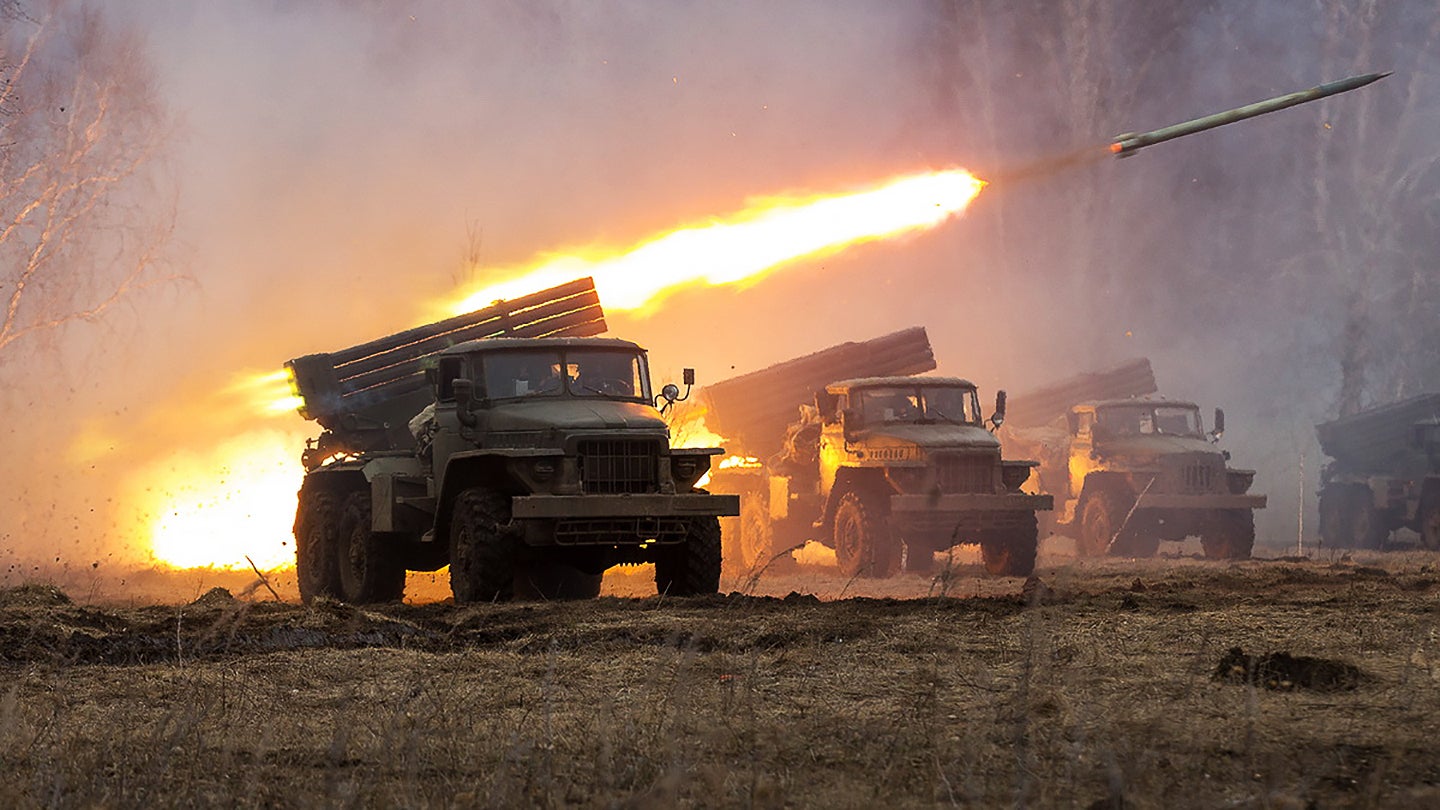Ukrainian authorities say that Russia has launched its much-anticipated new offensive in the country's eastern Donbas region. Heavy Russian artillery barrages, as well as potential airstrikes, have been reported along virtually the entire current front line, from Kharkiv in the northeast to Mykolaiv in the south. A senior U.S. defense official said earlier in the day that Russia's forces would rely on artillery, as well as heavy armor, for this new phase of operations owing to the flatter terrain in this part of Ukraine, which makes it more favorable to traditional mechanized operations. This is something The War Zone explored in detail just last week.
Reports that Russian artillery and aircraft were pounding targets near-simultaneously across a broad swath of eastern and southern Ukraine first began to emerge shortly before 11:00 PM local time. There were reports that Ukrainian units in certain areas of the Donbas had been subjected to intense bombardments earlier in the day, as has often been the case in recent weeks, but the new strikes appear to be more coordinated.
The Tweet below from the U.K. Ministry of Defense shows the general locations of the front lines in Ukraine, from Kharkiv to Mykolaiv, as they existed on April 18.
Since the end of March, there have been steadily growing indications that the Russian military has been repositioning, resupplying, and refitting units ahead of a new major offensive focused primarily on securing all of the Donbas and potentially aimed at bifurcating the country to a broader degree. The Russian Ministry of Defense had more or less said this was its plan on March 25, when declared the first phase of the operation in Ukraine to be over. Since 2014, the Russian government has actively supported separatists in two breakaway republics in the Donbas region, officially recognizing the self-styled Luhansk and Donetsk People's Republics as independent countries in the lead up to its all-out invasion in February.
"This morning, an active phase of the Russian offensive set off almost along the entire front line, the occupiers tried to break through our defenses," Oleksiy Danilov, the Secretary of Ukraine's National Security and Defense Council, subsequently wrote on Twitter. "Our military is defending, we are not surrendering our territories."
Danilov said that Russia's military has been tasked with capturing all of Ukraine's Luhansk and Donetsk regions, which collectively make up the Donbas, as an Easter "gift" for the country's President Vladimir Putin. Easter Sunday in the Eastern Orthodox Church falls on April 24 this year.
It's unclear what information Danilov might have been working with to make this assessment. There had been reports in the past that the Russian military might be pushing to achieve a major victory of some kind in Ukraine by early May, ahead of the annual marking of the Soviet Union's defeat of Nazi Germany during World War II.
The Russian government has said from the beginning that a core goal of its "special military operation" is the "denazification" of Ukraine, which many have taken to be an implicit call for regime change. In response to all of this, Ukrainian officials have said that Russia's invasion is equivalent to, or even worse than, the occupation by the Nazis. In his Tweets about Russia's new offensive, Danilov, who also warned against underestimating Russia and called on Ukrainian civilians to flee frontline areas, referred to Putin as the "Fuhrer," a clear reference to Hitler.
Danilov also said that he could not confirm that Yevgeny Prigozhin was in Russian-occupied areas of the Donbas. Prigozhin, often referred to as "Putin's chef" or "Putin's cook," is a notorious oligarch who, among other things, has links to the Russian private military company known as Wagner and an online misinformation and disinformation outfit called the Internet Research Agency, both of which have strong ties to Russia's intelligence agencies. Wagner has been active in the Donbas since 2014-2015 and it had reportedly begun deploying additional elements to the region back in March.
Ukrainian President Volodymyr Zelensky subsequently made a televised address where he announced that Russia's long-awaited offensive in the Donbas had started. "We will defend ourselves. We will fight," he declared.
The General Staff of Ukraine's armed forces further confirmed that Russia's new offensive appears to have started.
How Russia's offensive in Donbas, as well as other areas of northeastern and southern Ukraine, will now proceed remains to be seen. Just today, a senior U.S. defense official said that artillery was expected to play a major role, as it has already in Russian operations in Ukraine. That individual said Russia's military could be expected to rely more heavily on armored forces, which could seek to take advantage of the flatter and more open terrain of the Donbas region.
The War Zone previously explored how the Donbas presented an ideal environment for mechanized warfare and how, in turn, this meant Ukraine would likely need more tanks and other heavy armored vehicles of its own to push back against any new large-scale offensive in the region. The U.S. government, among others, appears to have arrived at a similar viewpoint in recent weeks, with new military aid packages for Ukraine increasingly featuring armored vehicles and heavy artillery. Until recently, foreign military assistance for Ukraine had been centered almost exclusively on infantry weapons, including shoulder-fired anti-tank and anti-aircraft missiles.
At the same time, Russian forces appear to have tried and failed to break holes in a portion of the Ukrainian front lines in and around the Donbas region recently. Russian advances in Ukraine have already been hampered for weeks by a mixture of poor leadership, low morale, and logistical failures, among other things. Russia's military recently appointed a new commander to oversee all operations in Ukraine, Aleksandr Dvornikov, who has extensive, if controversial experience leading forces in Syria, with a clear eye toward trying to turn things around.
No matter how the conflict in Ukraine continues to evolve in the coming days, weeks, and months, by every indication the Russian military has now launched a reinvigorated offensive in areas of eastern and southern Ukraine with an eye toward achieving greater successes with more limited objectives.
Contact the author: [email protected]









